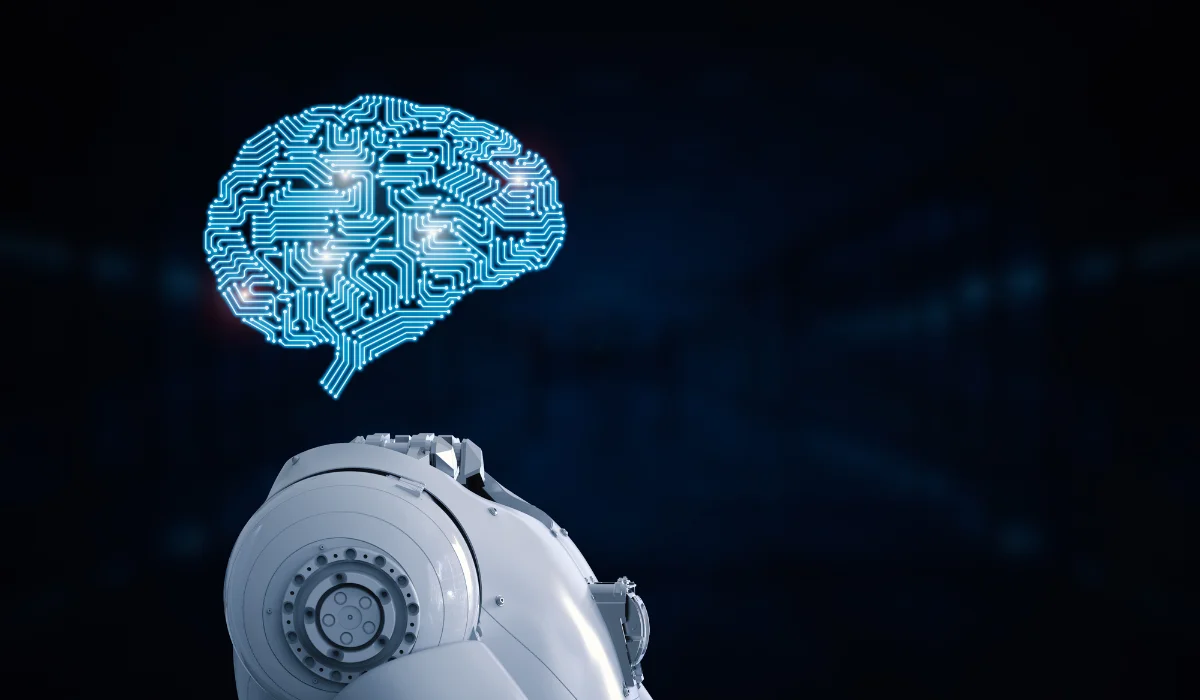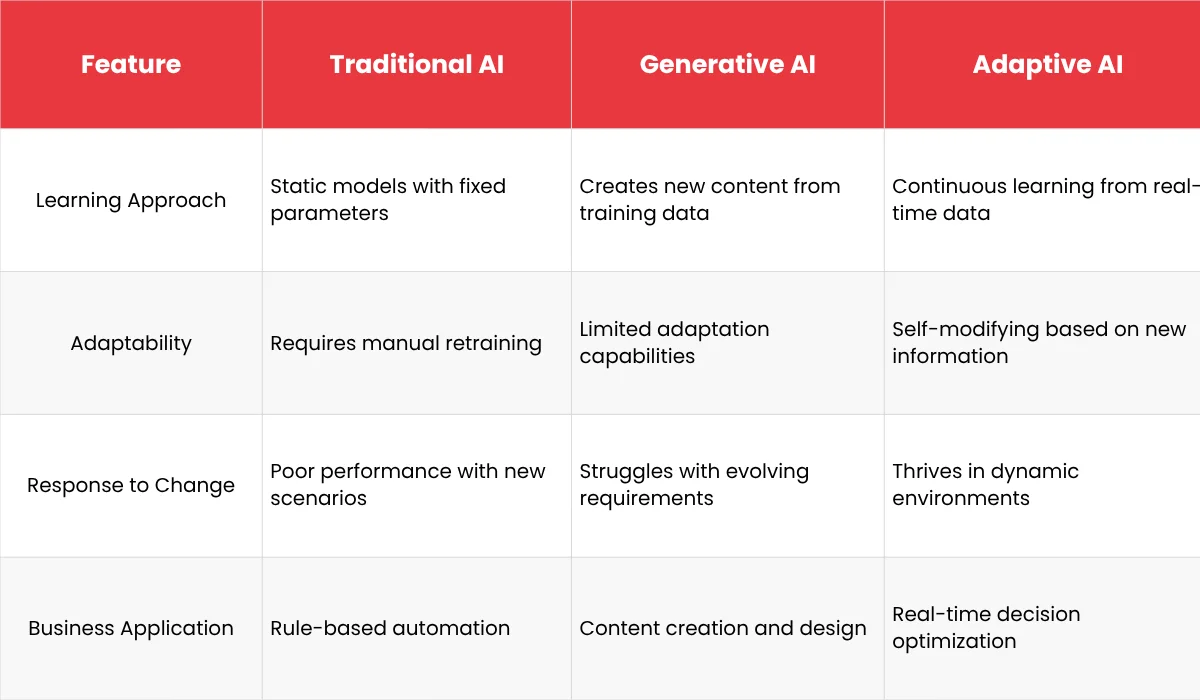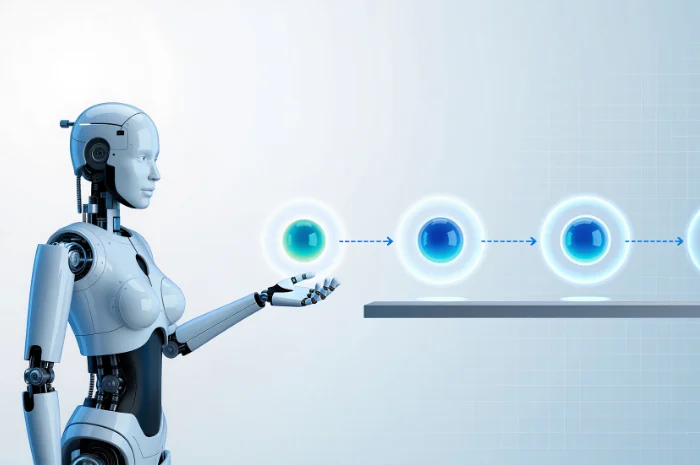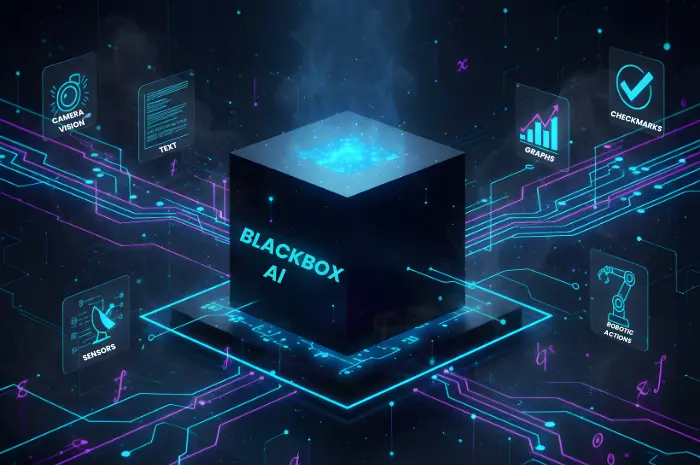Adaptive AI solutions represent the next evolution in artificial intelligence, featuring systems that learn and adjust their responses in real-time based on new data and changing conditions. Unlike traditional AI that follows predetermined rules, adaptive artificial intelligence continuously refines its performance without requiring manual reprogramming.
Business leaders, technology managers, and decision-makers exploring intelligent automation will find adaptive AI systems game-changing for operational efficiency. IT professionals and entrepreneurs can leverage these technologies to build more responsive, resilient business processes that evolve with market demands.
But what powers adaptive AI systems and how different industries can use them. We will also discuss the advantages business can gain by deploying adaptive AI technology.
What is Adaptive AI?
Adaptive AI refers to intelligent systems that continuously learn from new data, user interactions, and environmental feedback. These models adjust their logic and decision pathways mid-stream, helping businesses respond dynamically to live conditions, whether demand spikes, supply-chain fluctuations, or emerging risks.
Key Capabilities of Adaptive AI
1. Self-Learning Capabilities That Evolve Without Human Intervention
Adaptive AI solutions possess sophisticated self-learning mechanisms that continuously refine their algorithms based on incoming data patterns. These intelligent adaptive systems automatically adjust their neural networks, optimize decision-making processes, and enhance accuracy without requiring manual programming updates from developers or data scientists.
2. Real-Time Data Processing for Instant Decision Making
Modern adaptive AI technology processes vast data streams instantaneously, enabling split-second responses to changing conditions. This real-time capability allows adaptive AI systems to make critical decisions within milliseconds, whether detecting fraud transactions, adjusting manufacturing parameters, or optimizing supply chain logistics based on current market demands and operational constraints.
3. Contextual Awareness That Responds to Environmental Changes
Adaptive artificial intelligence demonstrates remarkable environmental sensitivity, recognizing subtle shifts in operational contexts and adjusting behavior accordingly. These systems understand seasonal variations, market fluctuations, user preferences, and external factors that influence performance, automatically recalibrating their responses to maintain optimal effectiveness across diverse scenarios.
4. Pattern Recognition That Improves Performance Over Time
Advanced pattern recognition algorithms within adaptive AI solutions identify complex relationships and trends that human analysts might overlook. These systems continuously learn from historical data, user interactions, and outcome feedback, progressively improving their predictive accuracy and operational efficiency while discovering new optimization opportunities.
Also Read: 11 AI Technology Trends Driving the Next Shift
Key Technologies Powering Adaptive AI Systems

1. Machine Learning Algorithms That Continuously Update Models
Adaptive AI technology relies on sophisticated machine learning algorithms that automatically refine their performance through real-time data analysis. These self-improving systems identify patterns, adjust parameters, and optimize decision-making processes without manual intervention. The continuous learning capability enables adaptive artificial intelligence to respond dynamically to changing environments and evolving user needs.
2. Neural Networks That Mimic Human Brain Functions
Deep neural networks form the backbone of intelligent adaptive systems by processing complex information through interconnected layers. These networks simulate human cognitive processes, allowing adaptive AI solutions to recognize speech, interpret images, and make nuanced decisions. Advanced architectures like transformers and recurrent neural networks enable these systems to understand context, remember previous interactions, and adapt their responses based on accumulated experience and environmental feedback.
How is Adaptive AI Used Across Different Industries
-
Healthcare
Adaptive AI systems transform medical care by analyzing patient data in real-time to create personalized treatment protocols. These intelligent systems process genetic information, medical history, and current symptoms to recommend optimal therapies. Doctors receive precise insights that adapt as patient conditions change, improving treatment outcomes significantly.
-
Financial Services
Banks and financial institutions deploy adaptive AI technology to identify suspicious transactions within milliseconds. These systems learn from emerging fraud patterns and adjust detection algorithms automatically. Credit card companies protect millions of customers by recognizing unusual spending behaviors and blocking potentially fraudulent activities before damage occurs.
-
Retail
E-commerce platforms leverage adaptive artificial intelligence to anticipate customer preferences and shopping habits. These systems analyze browsing history, purchase patterns, and seasonal trends to deliver personalized product recommendations. Retailers increase sales conversion rates while customers discover relevant products matching their specific needs and interests.
-
Manufacturing
Smart factories implement adaptive AI solutions to streamline production workflows and reduce operational costs. These systems monitor equipment performance, predict maintenance needs, and adjust manufacturing parameters automatically. Production lines achieve higher quality standards while minimizing waste and downtime through continuous optimization.
-
Transportation
Urban transportation systems integrate adaptive AI implementation to manage traffic flow and reduce congestion. These intelligent networks analyze real-time traffic data, weather conditions, and special events to optimize signal timing. Cities experience smoother traffic patterns and reduced commute times through dynamic route adjustments.
Also Read: Which AI Technologies Are Worth Investing in Now
What Are the Benefits of Adaptive for Businesses

1. Reduce Operational Costs Through Automated Decision Making
Adaptive AI solutions dramatically cut operational expenses by automating complex decision-making processes across business functions. These intelligent systems analyze vast datasets in real-time, eliminating the need for manual oversight while reducing human error rates. Organizations typically see 30-40% cost reductions in areas like inventory management, resource allocation, and quality control processes.
2. Enhance Customer Experience via Personalized Interactions
Adaptive artificial intelligence transforms customer engagement by delivering highly personalized experiences at scale. These systems learn individual preferences, behaviors, and patterns to customize product recommendations, communication timing, and service delivery methods. The result is increased customer satisfaction scores and higher retention rates, as each interaction feels tailored to specific needs and preferences.
3. Resolve Problems Faster with Predictive Analytics
Predictive capabilities within adaptive AI systems identify potential issues before they escalate into costly problems. By analyzing historical patterns and current operational data, these technologies enable proactive maintenance scheduling, supply chain optimization, and risk mitigation strategies. This approach reduces downtime by up to 50% while improving overall system reliability and performance metrics.
How Businesses Can Deploy Adaptive AI Solutions
1. Get the Necessary Data Infrastructure Requirements
Adaptive AI deployment demands robust data architecture capable of handling real-time processing and continuous learning cycles. Organizations must establish scalable cloud infrastructure, implement data lakes for diverse information types, and ensure high-speed connectivity between systems.
Modern adaptive AI systems require seamless data flow from multiple sources, including IoT devices, customer interactions, and operational metrics. The infrastructure should support both batch processing for historical analysis and stream processing for immediate decision-making, creating a foundation where adaptive artificial intelligence can operate at peak efficiency.
2. Train Your People for Smooth Technology Adoption
Successful adaptive AI implementation hinges on comprehensive workforce preparation across technical and non-technical teams. Training programs should cover system operation, data interpretation, and change management to ensure employees embrace rather than resist technological advancement.
Organizations benefit from creating role-specific curricula that address how adaptive AI systems will enhance daily workflows rather than replace human expertise. Cross-functional workshops help teams understand how intelligent adaptive systems integrate with existing processes, while ongoing education ensures staff remain current with evolving adaptive AI technology capabilities.
3. Build Security Protocols That Protect Sensitive Information
Adaptive AI systems process vast amounts of sensitive data, making robust security frameworks essential for protecting organizational assets and customer information. Multi-layered security approaches include encryption for data in transit and at rest, access controls based on user roles, and continuous monitoring for unusual system behavior.
Regular security audits and penetration testing help identify vulnerabilities before malicious actors exploit them. Organizations should implement zero-trust architectures where every system component requires verification, ensuring that adaptive AI solutions maintain data integrity while delivering business value.
4. Track Performance Metrics to Measure Success Rates
Measuring adaptive AI effectiveness requires establishing clear performance indicators that align with business objectives and operational goals. Key metrics include system accuracy rates, response times, learning curve progression, and user adoption statistics.
Organizations should track both quantitative measures like prediction accuracy and cost savings alongside qualitative factors such as user satisfaction and process improvement. Regular performance reviews help identify areas where adaptive AI deployment strategies need refinement, ensuring continuous optimization and maximum return on technology investment.
Difference Between Adaptive AI and Generative AI and Traditional AI

Traditional AI systems operate on predetermined rules and static datasets, while generative AI focuses on creating new content but lacks the ability to adapt to changing conditions. Adaptive AI technology bridges these limitations by combining continuous learning with real-world responsiveness, making it ideal for complex business environments where conditions constantly evolve and optimal performance requires ongoing system refinement.
Conclusion
Adaptive AI solutions represent a transformative shift from static algorithms to intelligent systems that learn, evolve, and improve their performance based on real-time data and changing conditions. These solutions combine machine learning, neural networks, and advanced analytics to create systems that adapt their behavior without requiring manual reprogramming.
From healthcare and finance to manufacturing and retail, businesses across industries are leveraging adaptive AI to automate complex processes, predict outcomes more accurately, and respond dynamically to market changes.
The competitive edge that adaptive AI provides extends far beyond simple automation. Organizations implementing these solutions gain the ability to optimize operations continuously, reduce costs through intelligent resource allocation, and deliver personalized experiences at scale. Partnering with an Adaptive AI development company will help in building and scaling the solutions effectively.
FAQs
What is the meaning of adaptive AI?
Adaptive AI is a type of artificial intelligence that can adjust its behavior based on new data or changing conditions. It learns continuously from real-world feedback to improve its performance without needing to be retrained from scratch.
What is the difference between generative AI and adaptive AI?
Generative AI creates new content such as text, images, or music based on patterns it has learned .Adaptive AI focuses on learning and improving over time by responding to new information and changing environments.
Is ChatGPT an adaptive AI?
Not fully. ChatGPT was trained on large datasets but does not automatically update its behavior from each interaction.
What are the adaptive AI tools?
Adaptive AI tools include platforms and frameworks that allow models to learn continuously, such as TensorFlow, PyTorch, IBM Watson, Microsoft Azure AI, and Google Vertex AI. These tools support building systems that update and improve based on new data.






